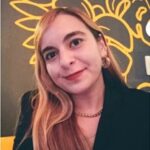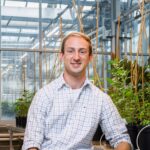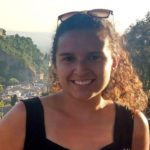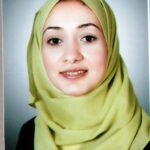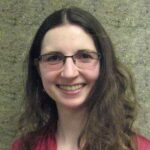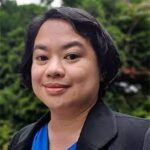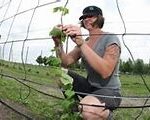Current Members
Principal Investigator
Dr. Hoagland received a BS in Environmental Science and MS in Agroecology from the University of Nebraska-Lincoln (UNL), and a PhD in Soil Microbiology and Biochemistry from Washington State University (WSU). Prior to starting her graduate studies, she spent three years working in the organic seed industry at NC+ Organics, and after obtaining her PhD spent three years working as a post-doctoral research associate in Plant Breeding at WSU. She joined the faculty at Purdue University in 2010 in a newly created position designed to support the growing local food sector. In 2019, she moved to Bogota to spend 6 months as a Visiting Professor at the National University of Colombia supported by the Fulbright Program. In 2021, she took on the role of Co-Director and lead PI of the Arequipa NEXUS Institute. The institute links researchers from Purdue and the National University of San Agustin (UNSA) to collaboratively address environmental, agroeconomic, and social challenges limiting the development of adaptive, profitable, and sustainable food-energy-water systems in the Arequipa Region of Peru. More information about the NEXUS can be found here: https://www.purdue.edu/discoverypark/arequipa-nexus/en/index.php. In 2021-22 she participated in LEAD21, a training program designed to develop leaders in land grant institutions and their strategic partners who link research, academic, and extension in order to lead more effectively in an increasingly complex environment.
Post-Doctoral
Dr. Martinez joined the Hoagland Lab and Arequipa Nexus Institute as a post-doctoral scholar in fall 2023. She holds a PhD in Plant Pathology from the Automonas University in Madrid, Spain. Prior to this she worked at the Institute of Subtropical and Mediterranean Horticulture 'La Mayora' (IHSM-UMA-CSIC Malaga-Spain), and characterized a new begomovirus that affects tomato, pepper and beans in Peru, During her doctoral studies she worked at the National Center of Biotechnology (CNB-CSIC Madrid-Spain) in the Department of Plant Molecular Genetics developing her doctoral thesis titled 'Participation of mitochondria in the defense response of Arabidopsis thaliana against infection by pathogenic microorganisms'. During these studies she also received training at the Brazilian Agricultural Research Company EMBRAPA in Production and Formulation in Entomatogenic Fungi, and at The Egyptian International Center for Agriculture (EICA) in Integrated Pest Management. Since graduating she has been a consultant at SENASA to prepare Pest Evaluation Manuals and biological control agents for potato, tomato, quinoa, citrus, banana, pineapple, vine and apple tree; atr the Universidad Nacional Mayor de San Marcos in the Hydrogel project to improve quinoa and canihua cultivation lands; and for the Andean Community CAN; and has been a volunteer for NCBA CLUSA's Farmer-to-Farmer program in quinoa and cocoa cultivation. She is currently working with farmers in the Colca River Valley of Peru to evaluate and improve the health of their soils and crops, and investigating how feedstocks and processing conditions influence microbiome-mediated processes in locally made bokashi and other soil amendments.
Graduate Students
Cristian joined the Hoagland lab as a PhD student in summer 2022. Prior to starting his graduate studies, he obtained a BS in Biology from the National University of Colombia in Bogota. During his undergraduate studies, he conducted an internship in the Hoagland lab, where he determined how heavy metal stress can interact with plant genotype to influence the composition and functional attributes of seedborne endophytes in quinoa. For his graduate studies, he is working on projects aimed at addressing agricultural challenges associated with soil contaminants and pathogens by leveraging microbial ecology and science diplomacy.
Henrique joined the Hoagland Lab as a PhD student in summer 2023. He holds a BS in Agronomy and MS in Soil Science and Plant Nutrition with emphasis in Soil Microbiology in Brazil. His graduate students in the Hoagland Lab are aimed at identifying genetic markers associated with microbiome-mediated suppression of foliar diseases in tomato.
Kathleen joined the Hoagland Lab as an MS student in summer 2022. She holds a BS in Horticulture at Purdue University. . Her research is aimed at understanding why carrot genotypes vary in heavy metal uptake and developing new tools to assist with these studies with the long-term goal of reducing human health risks.
Kayla joined the Hoagland Lab as an MS student in spring 2024. She holds a BS from Cornell University and worked for the NRCS in North Dakota before joining the Hoagland Lab. She is conducting studies investigating microbiome-mediated genetic resistance to pathogens in carrot, and the role of foliar nutrient sprays in altering carrot leaf and root microbiomes and their functional capacity to suppress diseases and improve carrot taproot quality.
Lily joined the Hoagland Lab as an MS student in Fall 2023. Prior to joined the lab, she received a BS in Botany and Plant Pathology at Purdue University. She joined the Hoagland Lab as an MS student in Fall 2023. Her graduate studies are aimed at focused on developing the application hyperspectral imaging and machine learning to quantify and better understand mechanisms mediating plant stress responses to soil contaminants.
Miné joined the Hoagland Lab as a PhD student in Fall 2024. She holds a bachelor's degree in civil engineering from the University of Petoria and an MSc in soils and sustainability from the University of Edinburgh and has worked for several environmental engineering firms in South Africa and Scotland. Her graduate studies are focused on developing new approach to remediate contaminated lands for healthy food production.
Undergraduate Students
Sophia is pursuing a BS in Sustainable Food and Farming Systems. She has experience working at the student farm and with culinary studies. This summer she will be managing a study evaluating the performance of experimental choclo corn and nuna popping beans, and working with chefs to evaluate their culinary attributes.
Visiting Students
Sandra is currently an undergraduate student at Zamorano University studying crop production. She is conducting her senior research project in the Hoagland Lab investigating whether grafting modern tomato onto wild and domestic rootstock can alter plant induce systemic resistance to foliar pathogens.
Sara is currently an undergraduate student at the National University of Colombia-Bogota studying microbiology. She is conducting her senior thesis research in the Hoagland Lab, investigating how the nanoplastic contamination can alter the composition and functional potential of root-associated microbiomes in tomato.
Stephanie is a visiting scholar from Caldas University in Manizales, Colombia. She is conducting studies aimed at developing 'smart composting bins' that will improve the quality and safety of soil amendments.
Former Members
Post-Doctoral
Dr. Rodriguez-Sanchez received his BS, MS and PhD degrees from the University of Granada, Spain in Environmental Microbiology and Engineering. He joined the Hoagland Lab in summer 2019 and was actively engaged in the Arequipa Nexus Institute. He conducted trials aimed at determining how the composition of soil microbial communities on peri-urban farms near Arequipa change in response to contamination with heavy metals and salts, and how this in turn can influence the capacity of these microbes to help plants withstand salt and heavy metal stress. He also investigated genetic controls on endophyte communities in quinoa, determining how these microbes are influenced by cadmium (Cd) stress, and how they can influence Cd uptake in this important crop. Finally, he characterized the composition and functional role of microbial communities in landfill leachates, with the long-term goal of managing these microbes to capture valuable elements from landfills. Dr. Rodriguez-Sanchez is currently a post-doc at the University of Granada.
Dr. Jaiswal received a BS in Agriculture from Tribhuvan University in Nepal and an MS and PhD in Agroecology and Plant Health in a joint program with the Hebrew University and The Volcani Center in Israel. His graduate studies focused on identifying the mechanisms regulating biochar mediated plant growth promotion and plant defense responses. He joined the Hoagland Lab in spring 2018, and conducted studies aimed: 1) elucidating the mechanisms regulating induced systemic resistance to foliar pathogens by beneficial soil microbes in tomato, and 2) quantifying the impacts of tomato domestication and breeding on rhizosphere processes. He is currently leading a research team at Lavie Bio in St. Louis.
Dr. Luis received her BS from the University of the Philippines Los Banos, MS from the University of Georgia, and PhD from North Carolina State University, all in Plant Pathology. After obtaining her PhD, Dr. Luis conducted optional practical training at Virginia Tech and postdoctoral study at The Ohio State University before joining the Hoagland Lab in March 2023. She has significant expertise in phenotyping drought stress in crops, characterizing the genetic and mycotoxigenic diversity of plant pathogens, and plant disease epidemiology, using this understanding to develop innovative approaches to suppress diseases using biological control and other management strategies. During her time in the Hoagland Soil Microbial Ecology Lab, she investigated how induced systemic resistance to foliar and soil-borne pathogens in tomato can be enhanced through breeding and nanoemulsions derived from essential oils. She is currently an Assistant Professor at the University of Hawaii.
After successfully completing her PhD in the Hoagland Lab in 2018, Dr. Abdelrazek transitioned to a postdoctoral research associate. She continued to study plant-associated endophytes in carrots, and took on a new project to aimed at determining whether anaerobic soil disinfestation could be used to successfully control Verticillium wilt in mint crops. She is currently a post-doctoral research associate at Virginia Technical University.
Dr. Wang received his BS and MS degree in Taiwan and his PhD from Purdue University. He joined the Hoagland Lab in fall 2021. During his time in the lab, he investigated interactions between native soil microbial communities and changes induced by different substrates during anaerobic soil disinfestation, and how these interactions contributed to the suppression of Verticillium wilt in mint. He also initiated studies investigating how soil properties in urban agricultural systems influence the survival of food-borne pathogens. He is currently working for a company in Boston developing beneficial microbial inoculants.
Graduate Students
Kyle is from Vincennes, IN where he attended Vincennes Lincoln High School and graduated in 2013. He played collegiate soccer at the University of Evansville and also the University of Southern Indiana where he received his Bachelor of Science degree in Food & Nutrition in the spring of 2018. He joined the Hoagland Lab as a graduate student in spring 2019 and completed his MS in December 2020. During his MS project, he investigated whether leaf mold compost could restore degraded soils and increase crop productivity in urban agricultural systems and increase survival of a beneficial microbe with antagonistic activity against tomato pathogens. He also conducted a survey of graduate students at Purdue University to identify barriers and opportunities to increase food access and nutrition via participation in urban ag gardens. He is currently working as a research technician at Texas A&M University.
Lisseth obtained her BS in Agricultural Engineering from the University of Colombia-Bogota. During the final year of her BS degree, she conducted an internship in the Hoagland Lab, where she investigated how crop management practices could alter arbuscular mycorrhizal fungal communities and affect the potential for soybeans to tolerate water stress. After completing her degree, she returned to the Hoagland Lab as a graduate to follow up on this research, completed her MS in 2018.
Maria obtained her BS in Biology at the Antillean Adventist University in Puerto Rico. During her undergraduate studies, she conducted a research project evaluating the implications of unrestricted pesticide use on the health of local farm workers. Her interests in the health impacts of agricultural production led her to apply for a fellowship with the US-AID project, Cacao for Peace, which is aimed at supporting growth of the cacao industry in her native Colombia, by overcoming challenges associated with cadmium accumulation. She initiated her graduate studies in the Hoagland lab in 2018, and evaluating the potential for hyperspectral imaging to detect heavy metal uptake in plants, and completed her MS in 2020.
Matt obtained his BS in Microbiology and PhD in the interdisciplinary PULSe microbiology training program, both at Purdue University. He conducted his doctoral research in the Hoagland Lab where he investigated how the long-term effects of different management programs could alter soil health, influence nitrogen cycling activities and affect vegetable productivity. He is now a molecular clinical specialist with Roche Diagnostics.
Narda obtained her BS in Biology and Microbiology from the Universidad de los Andes in Colombia. During her undergraduate studies, she conducted internships at the International Center for Tropical Agriculture (CIAT) where she focused on Brachiaria diversity and nitryfing microorganisms in soil. She started her graduate studies in the Hoagland Lab in 2018, where she investigated differences in nitrogen scavenging among carrot genotypes, and the role that microbially mediated organic matter priming plays in these interactions. She also conducted studies aimed at identifying the best approach to identify bacterial endophyte communities in carrot roots by combining molecular and tissue techniques. She completed her MS in 2020 and is now a PhD student at the University of Oregon.
Nathan obtained his BS in English and MS in the Ecological Sciences and Engineering program, both at Purdue University. He conducted his MS research in the Hoagland Lab investigating how different types of biochar amendments could interact with soil type to influence the suppression of the pathogen, Phytophthora capsici in vegetable production systems, He is now the statewide urban agriculture coordinator for Purdue Extension.
Sahar earned a BS, MS and PhD in Plant Pathology from Assiut University in Egypt, where she conducted research to manage vegetable diseases. She joined the Hoagland Lab in 2014 to gain additional research experience in microbial ecology and molecular techniques, while earning a second PhD in Horticulture in 2018. Her doctoral research focused on the role of endophytes in improving carrot performance and resistance to key pathogens.
Xiaojun completed her BS in Horticultural Science from Nanging University and completed her MS in the Hoagland Lab in 2016. During her MS studies, she investigated how residual products from the Indiana Forest Industry could alter soil microbial communities and their potential to suppress the pathogen Phytophthora capsici in pepper.
Undergraduate Students
Casey was a student in the Agriculture and Biological Engineering program at Purdue. She completed a summer undergraduate fellowship (SURF) and a senior thesis in the Hoagland Lab investigating biological control strategies for pathogen nematodes in carrot.
Camille assisted with several research studies in the lab before completing her BS degree in Agricultural and Biological Engineering.
Chengxuan assisted with several research projects before leading his own project investigating relationships between microbial communities in different potting media and induced systemic resistance against gray mold in tomato. He is currently an MS student at George Washington University.
Grace is a student in the Agricultural and Biological Engineering program at Purdue. She started working in the Hoagland Lab in Fall 2020 and has been conducting research to quantify genetic variation in cadmium uptake among quinoa genotypes and determine how cadmium stress can alter the composition and functional potential of endophytes in quinoa seed. She is currently an MS student at Boston College.
Hannah worked for the lab years assisting with several projects and completing her own independent senior thesis project investigating how mycorrhizal diversity can influence cadmium uptake in carrots. She is currently in medical school at IUPUI.
Judith assisted with several projects before taking the lead on a project investigating the potential for hop production in fence rows around forest nurseries. She is currently an MS student at Cornell University.
Melody worked in the lab for two years, assisting with several projects including a trial investigating how different types of potting media and fertilizer can influence the composition of microbes living in the rhizosphere and endoshere of tomato transplants, and how this could influence resistance to pathogens.
Silenze is a student in Natural Resources and Environmental Science program at Purdue, specializing in environmental microbiology. They started working in the Hoagland Lab in fall 2019. They are conducting a research project investigating how CO2 enrichment due to climate change can influence tripartite relationships between beneficial microbes, pathogens and plants, which could have important implications for managing diseases using biological control practices
Tim conducted an independent research project investigating the potential for biodegradable mulches to promote sweet potato production in Indiana. He is currently an MS student at Purdue.
Visiting Scientists
Dr. Colla is a Professor of Horticulture at the University of Tuscia in Viterbo, Italy. He spent a year in the Hoagland Lab during a sabbatical, investigating relationships between biostimulants, plant microbiomes and vegetable productivity and quality.
Dr. Melgarejo is a Professor at the National University of Colombia in Bogota. She spent 4 months in the Hoagland Lab during a sabbatical, investigating relationships between crop management practices, arbuscular mycorrhizal communities and plant resilience against water stress.
Dr. Cardarelli is a scientist with the Italian Ministry of Agriculture in Rome, Italy. Shee spent a year in the Hoagland Lab during a sabbatical, investigating relationships between biostimulants, plant microbiomes and stress responses in vegetables.
Sherlyn Tipayno is an associate professor at the Department of Biology in Benguet State University. She will have her placement at the Department of Horticulture and Landscape Architecture in Purdue University, Indiana under the Agricultural Scholarship Program (FPASP) for advance research. Her research work will be on soil microbial metagenomics, focused on understanding the influence of different agroforestry practices on the composition and functional potential of soil microbial communities, and how these influence productivity and quality of Arabica coffee.
Sherlyn finished her Ph.D. in Agriculture Chemistry at Chungbuk National University in Cheongju City, South Korea where she worked on agricultural soil microbial communities under heavy metal and salt stresses. Her field of interest in research is on soil and environmental microbiology, particularly, microbial community responses to abiotic stresses in the environment as well as beneficial soil and plant microbial populations that have applications in enhancing crop production and remediation of pollutants. She currently teaches undergraduate and graduate level Microbiology and other Biology courses at BSU. She hopes her time as a Fulbright scholar at Purdue University would not only allow her to gain new knowledge and skills that she can share to her students and colleagues but an opportunity to engaged in long term collaborative research works that would bring wider, if not a global perspective to addressing problems, especially in agriculture and food production, of benefit to both countries.
Apart from research work, Sherlyn enjoys nature and travelling, whenever means and opportunity are on hand. Otherwise, she finds as much satisfaction in drinking coffee, doing simple handyman chores and actual farm works.
Erica has a BS in Biology and is participating in a post-bachelorette program to gain experience in preparation for starting a PhD program. As part of this program, she is conducting a research project in the Hoagland Lab, investigating microbial controls on pathogen suppression in compost.
Lina led a research project identifying how legacies of metals contamination from biosolids in the 1970's altered the composition of soil microbial communities and their capacity to mediate cadmium uptake in grain crops. She currently works at EAFIT University in Medellin, Colombia.
Visiting Students
Christian was a visiting scholar from the National University of Colombia in Bogota. He conducted studies to quantify the composition and functional role of seed-borne endophytes in quinoa and how these are influenced by cadmium stress.
Christopher assisted with several research projects in the lab during an internship. He went on to graduate school at the University of Missouri.
Estaban is a senior at the National University of Colombio-Bogota. He conducted his senior thesis project investigating the impact of legiminous intercropping on the root and seed microbiomes of coffee in collaboration with Cenicafe.
Gabriela conducted an independent research project investigating differences in cadmium uptake among a broad set of carrot genotypes. She currently works for a non-profit organization in the Galapagos Islands.
Gustavo conducted an independent project investigating the potential for different types of biochar amendments to immobilize cadmium and prevent uptake into leafy green crops. He is currently an intern at the University of North Dakota.
Jaime is a student at Caldas University in Manizales, Colombia studying Agricultural Business Administration. He is currently conducting a 6 month research internship in the Hoagland Lab where he is investigating genetic controls on cadmium uptake in quinoa.
Leidy conducted an independent research project investigating how feedback effects from different carrot genotypes can alter soil microbial community structure and influence susceptibility to root-knot nematodes in subsequent carrot crops.
Liliana conducted an independent research project investigating the potential for different types of compost, biochar and mycorrhizal inoculants to mitigate cadmium uptake in leafy greens.
Maria was a visiting scholar from Caldas University in Manizales, Colombia. She conducted studies to quantify the composition of microbial communities in different types of compost amendments and how this can influence induced systemic resistance against gray mold in tomato.
Natalia is a student at Caldas University in Manizales, Colombia studying Agricultural Business Administration. She is currently conducting a 6 month research internship in the Hoagland Lab where she is investigating biological approaches to increase the quality of mint oil while reducing damage by Verticillium wilt.
Nelsy was a visiting scholar from Caldas University in Manizales, Colombia. She conducted a research project investigating how microbial communities in different types of compost could influence induced systemic resistance against foliar pathogens in tomato.
Usama characterized the composition and potential functional role of soil microbial communities in hypersaline soils from Pakistan. He is currently back in Pakistan finishing his PhD.
Research Technicians
Lily recently her BS in Botany at Purdue University. While she was an undergraduate student, she assisted with projects investigating mechanisms mediating induced systemic resistance in tomato. As a technicican she conducted studies to quantify soil health in urban farms across the state of Indiana,











